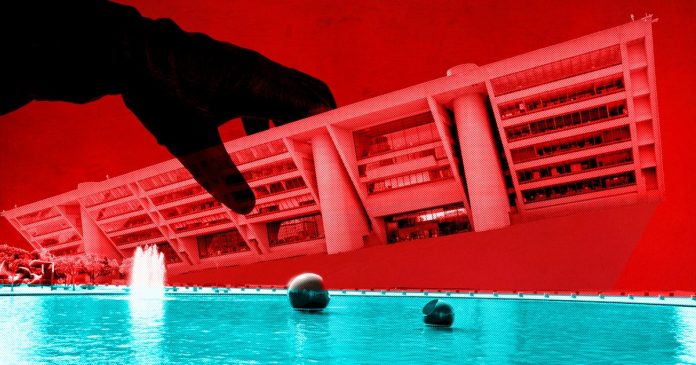It’s difficult to steal a building, and even harder when that building is made of poured-in-place concrete and roughly the size of an aircraft carrier. But that is precisely what is happening to Dallas City Hall — a monumental theft transpiring in plain sight — with the City Council seemingly bent on plans to abandon the building to developers who will surely demolish it, all without any serious consultation, let alone permission, from the people who own it, namely you, the Dallas taxpayer.
If this were a heist film, it would still be in the plotting stages. Alas, there will be no movie stars on hand this Wednesday, when the City Council is set to direct city staff to investigate the benefits of selling the building in the name of economic development and to determine the costs of moving the city government to a downtown office tower.
The situation is the product of a confluence of events: a deferred maintenance bill that, over the course of less than a month, has somehow ballooned from around $100 million (which seemed grossly inflated) to as much as $595 million (if you believe city staff); the redevelopment of the adjacent convention center, which has made the City Hall site an attractive target for developers; and the Dallas Mavericks’ desire for a new downtown arena.
Is it a coincidence that City Hall’s deferred maintenance has become an urgent issue as the convention center development and arena discussions have accelerated? It’s hard to believe there is no connection. “I am concerned about the transparency of this process because there has been little, if any, engagement with Dallas residents about this important issue,” says council member Paul Ridley, one of a small minority fighting to stop the steal, as it were. “I have concern that there is momentum to move forward with a plan to abandon City Hall.”

Aerial view of I. M. Pei’s City Hall and plaza under construction in 1976.
TOM DILLARD/Staff Photographer / dallas Morning News
A farce
The push to ditch architect I. M. Pei’s iconic building has unfolded over the course of several council hearings that have achieved a level of farce unusual even by Dallas standards. It began with a meeting of the council’s Finance Committee on Oct. 21, at which city staff put forward a deferred maintenance bill exceeding $100 million without having undertaken a comprehensive condition assessment or structural analysis of the building. Staff members also admitted they had no data on the costs or economic impact of a move out of City Hall. This prompted the committee chair, Chad West, to pull a random real estate developer out of the audience to opine on the benefits of moving to a downtown office tower. Not surprisingly, he endorsed that proposal.
This was followed, on Nov. 3, by a joint hearing of the council’s Finance and Economic Development committees at which West said the self-evidently rushed process was not being rushed because “we’ve been talking about deferred maintenance in our real estate portfolio for years.” Mostly, the council had been sweeping the issue under its fraying carpet.
Next came a bombshell revelation from Ridley, who had discovered that $7 million in 2017 city bond funds specifically allocated for building repair had not been spent and were sitting unused on the city’s books, along with an additional $69 million in unencumbered bond funds that could conceivably go to building renovation. City staffers say less than that $7 million is left on the books, but there remain funds available for repairs.
Until a serious review of the building is done by a team of professional architects and engineers, any estimate of the deferred maintenance costs presented by city staff should be considered with extreme skepticism. According to a review of the city’s assessments conducted this month by Zaida Basora, the executive director of the Dallas chapter of the American Institute of Architects, the actual costs for outstanding repairs to the building are between $25 million and $32 million. Basora is an authority on the building’s condition; as a longtime senior city staffer, she had direct oversight over City Hall bond projects.
Just as the costs for repair seem grossly exaggerated, the potential expense of moving city government into a downtown office tower seems wildly optimistic. “They really haven’t looked at what it will cost for comparable space,” says Ridley, of the city’s staff. To that point, a city government is not a standard commercial tenant; beyond the need for office space, it requires council chambers, ceremonial spaces, spaces for protest and extensive parking for city workers, city vehicles and the public, among other bespoke demands.
“There seems to be this mentality that we’re better off abandoning what we have and moving into some shiny new building instead of investing the money in an already paid-for building,” says Ridley. “To me that just doesn’t make economic sense.”
The city’s track record of evaluating properties does not inspire confidence. This past April, city officials admitted the building acquired to house the city’s building permitting department would have to be auctioned off because it did not — and this is not a joke — meet building code. “For such a large, impactful real estate acquisition, the City failed to be as thorough as it should have been,” City Manager Kimberly Bizor Tolbert said at the time.

Dallas City Council members Cara Mendelsohn (left) and Paul Ridley held a community meeting to hear residents’ thoughts on the future of City Hall in Dallas, Nov. 3, 2025.
Tom Fox / Staff Photographer
Warnings from history
If that is not an effective warning, an examination of the city’s development history should be.
Only the most senior of Dallas senior citizens can remember that downtown was once a bustling and crowded place. Now it is plagued by countless empty surface lots where buildings once stood. What happened? Developers demolished them, hoping for newer, bigger, more profitable projects, only to have the economy and their hubris undermine their fantasies.
It is not hard to imagine City Hall being razed only for the economy to turn and for the site to become yet another empty parking lot. There is, in any case, already plenty of vacant land downtown primed for development, including the space directly south of City Hall and some 30 acres that will be freed up by the reorientation of the convention center — a space large enough for a new arena.
Not that I would recommend building one. The Mavericks don’t need a new arena; they want a new arena. Although their current home, the recently upgraded American Airlines Center, is no architectural masterpiece, it is in fine condition. The reason the team’s owners want a new home is simple: They want to control the surrounding development. In Victory Park, they don’t.
Indeed, one subject that has not been addressed in any of the discussions about City Hall is Victory Park, the anodyne urban development only starting to emerge as an active neighborhood after decades of struggle. Removing its anchor tenant would be an enormous setback to its fragile status. More to the point, what is being proposed for the area around City Hall — an up-from-scratch development anchored by an arena — is simply another version of Victory Park. Why should it work any better on the other side of downtown? The city would simply be privileging one area for development at the expense of another, whack-a-mole style.
There is a certain irony here. Among the complaints about Pei’s City Hall design is that it is an exemplar of the urban renewal movement of the 1960s, when cities replaced historic buildings with new, often over-scaled architecture. That is precisely what proponents of City Hall’s demolition are calling for today: a whole new district dominated by a massive arena and a titanic convention center.
Do as I say, not as I do
The City Council’s disregard for economic reality might be eclipsed by its indifference to the rule of law. Earlier this year, the city’s Landmark Commission began the designation process for City Hall, initiating a two-year moratorium on any alterations to the building without the commission’s approval. But, because the building is city-owned, the council could withdraw it from consideration by the commission, an act of hypocrisy that would kneecap the commission ever after. “Do as I say, not as I do” is not a reasonable position for a city government.
Even if City Hall can be sold without public consent, neither city staff nor the City Council has explained how the same might be true of City Hall Plaza. The 1967 bond that paid for the plaza defined it as a park, and it is similarly defined that way in the city’s Downtown Parks Master Plan. According to Texas state law, designated park land may not be sold unless “the sale is submitted to the qualified voters of the municipality at an election and is approved by a majority of the votes received at the election.”
Would a majority of Dallas voters approve such a measure? I don’t know, but I do think they should have an opportunity to weigh in on the broader question of City Hall’s fate. There is already considerable evidence that they believe it should be maintained: A town hall meeting on the subject drew a large crowd opposed to any demolition and an online petition calling for the preservation of the building has received well over 3,300 signatures. That petition accurately describes City Hall as “a masterpiece of modern architecture and civic pride.”
It deserves better from our civic leaders.








